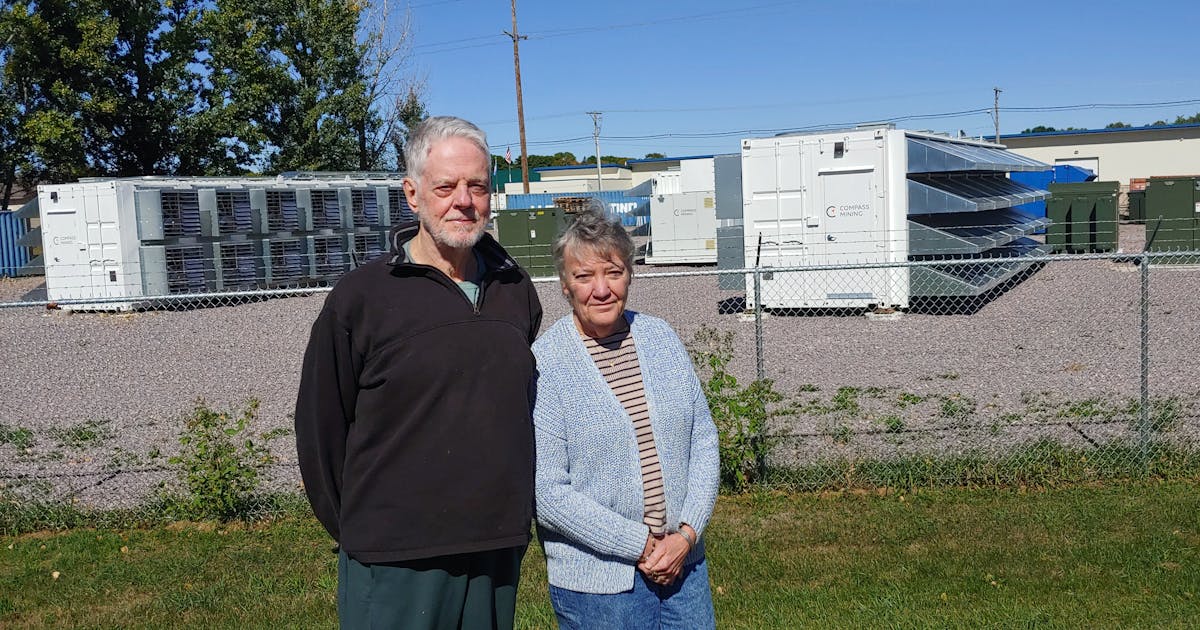Star Tribune
Neighbors unhappy about crypto mining operation in Glencoe, Minn.

GLENCOE, MINN. — Eddie Gould and Sandra Olson have lived for decades next to a cement plant, a canning factory and a busy truck route. But they say nothing has disturbed their peace and quiet like the crypto mining operation that recently opened in this McLeod County town about 50 miles west of the Twin Cities.
“It is the dominant factor of living here right now,” said Gould, a retired actor and taxi driver. “It rattles the fabric of our house and our yard. You can hear it 24 hours a day — it never stops.”
The couple said they’ve stopped using their backyard deck because of noise from the banks of computers and cooling fans about 200 feet from their property. Olson, who bought the house more than 50 years ago, said she’s “mad about the whole thing.”
Crypto mining is an intensive computing process that produces cryptocurrency, of which Bitcoin is the best-known example. Crypto miners use massive amounts of computing power to solve complex mathematical problems that yield value in the form of digital currency that’s traded outside the normal banking system.
The Glencoe crypto operation is owned by Bit49, a Colorado-based company. Cody Nelson, Bit49’s chief operating officer, said the company has gone to great lengths to respond to the couple’s concerns.
“We’ve done everything we can,” he said. “We consult professionals; they say, ‘Do this,’ and we do it.”
Throughout the Upper Midwest, cities and power companies are hoping to cash in on crypto mining, which uses massive amounts of electricity. For a power utility, a crypto mine can be a gold mine.
A new crypto mining operation in Jamestown, N.D., a city of about 16,000 residents, will use twice as much energy as the entire city. The Jamestown operation immediately ranked as the second-largest customer of Minnesota-based Otter Tail Power Co.
Meanwhile, Brainerd’s municipal power utility is moving forward on deals with two crypto operations that plan to locate in the city.
The Bit49 computers in Glencoe are outdoors in a fenced gravel lot across the road from the Olson and Gould home. Called “modular data centers,” they’re housed in large metal boxes that resemble shipping containers; they operate 24/7 and are cooled by banks of fans.
Nelson said the company has taken a number of steps to mitigate the noise from its operation, which opened last winter. They’re operating fans at lower RPM and have installed sensors that reduce the fan speed in cooler weather when the computers run less hot. Exhaust vents now have hoods and baffles that help diffuse the sound, and the company added an evaporative cooling system to further reduce the need for fan cooling.
Just last week, the company installed a polymer soundproofing blanket along the fence, which Nelson said could significantly reduce noise.
“That was an expensive fence,” Nelson said, costing tens of thousands of dollars. “We won’t be doing any more of that fence. It would be cheaper to buy their house.”
When Bit49’s crypto operation first opened, it was producing sound levels of 80 to 85 decibels, which is about the same as a gasoline-powered lawnmower or leaf blower running 24 hours a day. Nelson said the noise is now in the 70- to 75-decibel range, equivalent to a washing machine or dishwasher. The soundproofing blanket could reduce that by 20 decibels or more, he said, and the company plans to retest the noise level now that the soundproofing is installed.
Gould and Olson really shouldn’t have any expectation of quiet solitude, Nelson said, given that the land across the street from their home has been zoned for industrial use for decades. Seneca Foods has a busy corn-canning plant there, and there used to be a cement plant on the site, as well.
“Honestly, in my opinion, they’re making noise because they think we make a lot of money and they think they’ll get something out of it by fighting us,” he said.
In recent months, the value of digital currencies has crashed in what traders have called “crypto winter,” with the price of Bitcoin falling nearly 70%. Compute North, an Eden Prairie crypto data center, filed for bankruptcy protection last month with debt of between $100 million and $500 million.
The failure of a crypto mine could put a burden on other customers of utilities that bet heavily on the industry. But Dave Meyer, general manager of city-owned Glencoe Light & Power, said the company has planned cautiously to protect its 2,700 customers. The utility spent a modest amount on infrastructure to serve the crypto mine and has already recouped most of that investment, he said.
“When we decided to move forward with this venture, we vowed it would not have a negative financial impact on our customers,” he said. “This whole thing has been structured in that fashion. We certainly couldn’t let a situation arise that would impact our long-term customers because we were bringing in one new one.”
Meanwhile, Gould and Olson will be spending the sunny autumn days indoors rather than on their deck. They say the company’s efforts to cut the noise haven’t had much effect.
“No, no,” Olson said. “No. I don’t think there’s been any reduction at all. It seems to be just as loud as it was.”
Gould said the couple’s complaints to city and state officials have gotten no helpful response. The couple invited Glencoe’s mayor over to listen to the noise, Olson said, and got nowhere: “You might as well be talking to the vine here.”
“We’re worried about our health. We’re worried about our sanity,” Gould said. “We feel greatly oppressed.”
Said Olson: “I’m just crossing my fingers that this one will go under.”
Star Tribune
Bong Bridge will get upgrades before Blatnik reroutes

DULUTH – The Minnesota and Wisconsin transportation departments will make upgrades to the Richard I. Bong Memorial Bridge in the summer of 2025, in preparation for the structure to become the premiere route between this city and Superior during reconstruction of the Blatnik Bridge.
Built in 1961, the Blatnik Bridge carries 33,000 vehicles per day along Interstate 535 and Hwy. 53. It will be entirely rebuilt, starting in 2027, with the help of $1 billion in federal funding announced earlier this year. MnDOT and WisDOT are splitting the remaining costs of the project, about $4 million each.
According to MnDOT, projects on the Bong Bridge will include spot painting, concrete surface repairs to the bridge abutments, concrete sealer on the deck, replacing rubber strip seal membranes on the main span’s joints and replacing light poles on the bridge and its points of entry. It’s expected to take two months, transportation officials said during a recent meeting at the Superior Public Library.
During this time there will be occasional lane closures, detours at the off-ramps, and for about three weeks the sidewalk path alongside the bridge will be closed.
The Bong Bridge, which crosses the St. Louis River, opened to traffic in 1985 and is the lesser-used of the two bridges. Officials said they want to keep maintenance to a minimum on the span during the Blatnik project, which is expected to take four years.
Star Tribune
Red Wing Pickleball fans celebrate opening permanent courts

Red Wing will celebrate the grand opening of its first permanent set of pickleball courts next week with an “inaugural play” on the six courts at Colvill Park on the banks of the Mississippi, between a couple of marinas and next to the aquatic center.
Among the first to get to play on the new courts will be David Anderson, who brought pickleball to the local YMCA in 2008, before the nationwide pickleball craze took hold, and Denny Yecke, at 92 the oldest pickleball player in Red Wing.
The inaugural play begins at 11 a.m. Tuesday, with a rain date of the next day. Afterward will be food and celebration at the Colvill Park Courtyard building.
Tim Sletten, the city’s former police chief, discovered America’s fastest-growing sport a decade ago after he retired. With fellow members of the Red Wing Pickleball Group, he’d play indoors at the local YMCA or outdoors at a local school, on courts made for other sports. But they didn’t have a permanent place, so they approached the city about building one.
When a city feasibility study came up with a high cost, about $350,000, Sletten’s group got together to raise money.
The courts are even opening ahead of schedule, originally set for 2025.
Star Tribune
Nine injured in school bus crash in rural Redwood County, MN
REDWOOD FALLS, MINN. – A truck crashing into a school bus left nine with minor injuries Wednesday morning in rural Redwood County, a statement from the Redwood County Sheriff’s office said.
The bus driver, serving the Wabasso Public School District, failed to yield when entering the intersection of County Road 7 and 280th Street, the statement said.
Deputies received word of the crash around 8:15 a.m. and identified the bus driver as Edward Aslesen, 72, of Milroy.
The nine injured passengers on the bus were transported to local hospitals, the statement said.





GIPHY App Key not set. Please check settings